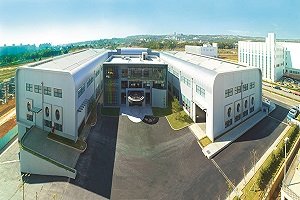Kuen Yuh Machinery Engineering Company (KYMC) based in Taiwan is a 48-year-old company and has more than 2,500 installations in over 90 countries. With its India office – KYMC India, it has had a stellar last couple of years in terms of expansion in its installation base. The wide web flexo technology is now finally taking off in India and KYMC India has been a clear beneficiary of this evolution with the hard work put in by them in the last six years. It is likely to be among the top two players in terms of the installation base in India by early 2017.
KYMC manufactures CI flexo, high speed stack flexo and in-line flexo presses. It has a wide range of CI flexo models including geared and gearless presses empowering the company with a great mix of technology capable of meeting individual needs of the Indian customers in terms of the investment and output. KYMC India is headed by Kunal Mehta who is complimented by a strong technical support team located strategically for prompt and total assistance to their customers. An experienced team of engineers routinely executes assignments in India. The team assists customers in defining the machine specifications, installation and commissioning of the presses, after-sales service, stabilization of the press as well as conducts an extensive training regime for customer’s staff.
In 2015, KYMC India installed five flexo presses and in 2016 it will be installing another six presses in the country taking its combined installation base to 20. South India, which was KYMC’s dominant market till recently, is now facing stiff competition from Gujarat. Out of the total five presses that KYMC India sold last year, two were in Gujarat and out of the six presses that it will install this year, four will again go to the Western Indian state and other two in North and South India.
“There is a lot of activity in Gujarat when it comes to adoption of flexo technology. The last two years have been especially exciting,” says Mehta. KYMC presses have been meeting the demands of various verticals of the packaging industry right from hygiene film for diaper back-sheets, PET / BOPP film for flexible packaging, multilayer PE for milk, oil, diaper outer packaging as well as for security bags and high-end shopping bags.
Flexo on a steady growth path

The take off in wide web flexo seen recently is expected to accelerate in coming years as the technology on all fronts right from press, prepress, inks, anilox and tapes, gets further refined. Mehta believes the growth rate in the number of installations in the coming decade will be much faster than the previous ten years. “The kind of adoption rate we have seen in the last few years has been very encouraging. There were around 40 flexo press installations in India during the ten years from 2006 to 2015 and before that there were about 20 installations. So the numbers itself tell you the kind of growth we are witnessing. In the coming ten years I am sure the total installations of flexo presses will be even higher,” Mehta says with a degree of confidence.
Surprisingly, there has been more receptiveness for adoption of flexo technology amongst medium sized converters. “In India, rotogravure is the predominant process for printing on polyester and BOPP while in the developed nations the preferred process is CI flexo. With an ability to meet the demands of a wide range of applications, flexo has already begun to carve out a name for itself in niche applications. Printed electronics and paper printing like pre-print, paper cups, paper bags are other applications of flexo which are yet to be explored and adopted in the Indian market. Considering the array of applications which flexo has to offer, it is sure to witness a huge boom in coming years,” Mehta concludes.











